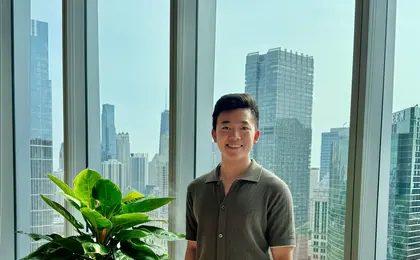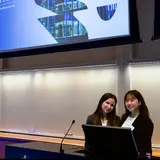Internship Spotlight: Austin Cai ’25, 53 Stations
A summer internship at a Chicago-based venture capital firm gave Austin Cai ’25 room to grow professionally and personally.
We asked rising second-year MBA students to check in from their summer internships, where they applied the lessons of their first year at Yale SOM.

Internship: 53 Stations, Chicago
Hometown: San Jose, California
Pronouns: he/him/his
The SOM class you’re using on the job: Venture Capital and Private Equity, Innovator, Introduction to Negotiation
Go-to work lunch: Au Cheval
After-work routine: Golf, workouts, and YouTube
Favorite thing about Chicago: I work remotely in the Bay Area but fly out to the firm’s HQ in Chicago at least once a month. Chicago is really fun in the summer and has a great food scene. I really enjoyed the comedy shows at Second City and walking along the river to relax.
“Just get your foot in the door.” This advice, often repeated during the venture capital recruiting process, stuck with me like the gum on the bottom of my shoe. In an industry that is difficult to break into, there’s no blueprint to follow; you must discover what works best for you. I was fortunate to learn that lesson early in my journey through coffee chats with SOM alums. Those conversations also made me realize that pursuing a summer internship would be almost futile without an initial in-semester VC internship. However, getting one wasn’t a simple feat. The initial weeks of internship recruiting felt like swinging a golf club in a dark room, trying to hit a fly.
As I honed my application approach, I eventually landed several in-semester VC internships that provided hands-on experience and allowed me to build my network within the investor and founder community. Eventually, these connections led me to 53 Stations, a VC firm that is solely backed by The Pritzker Organization (TPO). Because the firm has a single limited partner, it can be more flexible than many other venture investors, tailoring terms and timelines to the needs of each company it works with. The firm invests in companies from the seed to series B funding rounds, focusing on sectors of interest to TPO such as wealth management, healthcare, built world assets, and restaurant tech.
I chose 53 Stations over other firms for two main reasons. First, I appreciated the firm’s “student mindset” when approaching investments. The phrase is a nod to a Buddhist parable about the endless process of acquiring wisdom. A constant willingness to learn is especially important in VC, because great founders have deep product and industry knowledge to which investors may not be privy. An investor’s job is to constantly absorb knowledge, question assumptions, and recalibrate opinions while making an investment decision. The other reason I chose the firm was because of its relatively small size, which provided me plenty of autonomy to learn and grow. During the summer, I helped with sourcing and due diligence, while also playing a pivotal role in building out the firm’s automation workflows and AI tech stack for internal operations.


Throughout the internship, I learned how to evaluate deals using financial models, build out investment committee presentations, and participate in founder calls and market research interviews. Though I was relatively new to the field, Professor Song Ma’s course Venture Capital and Private Equity helped me acclimate to the rigors of Excel sheet analysis. I gained insights into the newest developments in business productivity and dusted off my engineering cobwebs to create several AI automations for the firm. By talking to advisors, customers, and founders within the space, I managed to learn a lot about the wealth management industry in a short period of time. Professor Tristan Botelho’s core course Innovator helped me empathize with startup founders and understand what they needed from an investor.
Sitting courtside at investment committee meetings offered me a glimpse into the inner workings of the partners’ thinking, transforming abstract concepts like “return on investment” into tangible business decisions. But there was also plenty of fun on the job. Dinners were full of entertaining anecdotes, from scuba diving mishaps to golf trips with celebrities. Going into the internship, I didn’t expect to do an offsite at a family farm—but it was an “udderly” good time bonding with the team over farm to table meals. I was inspired by the leadership team's commitment to fostering a culture that prioritizes understanding and supporting individual needs, which in turn contributes to the firm's growth.
A career in VC is not something you attempt half-heartedly. As a small green Jedi once said, “Do or do not, there is no try.” My advice to anyone looking to enter this field is to start early by leveraging the SOM network and even expanding to Yale as a whole. Connect with founders and find an industry you’re really interested in, and then apply to in-semester internships to gain valuable industry knowledge. Lastly, just remember this: Believe in yourself and trust the process!
Austin Cai is a recipient of the Zhenyi and Charles Liu ’11 MBA Alumni Fund Scholarship (2023-2024).



